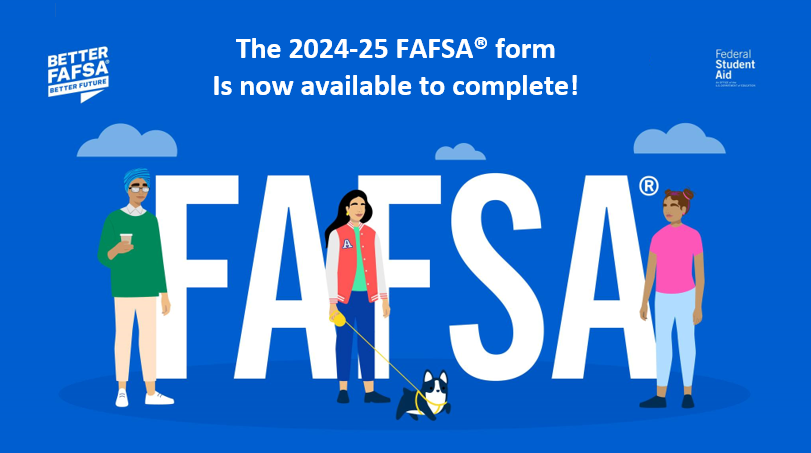2024-25 FAFSA Changes

Prepare for the FAFSA
While the 2024-2025 FAFSA won’t be available until January, you can still prepare by doing the following:
- Create an FSA ID on the Federal Student Aid website and assist contributors, such as your parent(s) or spouse, in creating an FSA ID.
- An FSA ID is an account and password that gives you access to the Federal Student Aid’s online system and serves as your electronic signature.
- With the FSA ID, you can fill out the FAFSA when it’s available, sign your Master Promissory Note (MPN), apply for repayment plans, complete loan counseling, and use the Public Service Loan Forgiveness Help Tool.
What’s staying the same
Students need to apply for Financial Aid through the FAFSA form every year.
The FAFSA will continue to request prior-prior year tax information (2022 for the 2024-2025 application)
Students will need to answer dependency questions to determine contributors.
What’s changing on the 2024-2025 FAFSA
Check out this video by the department of education regarding changes in 2024-2025.
IRS Direct Data Exchange
Previously, users had the option to enter their tax information manually or use the IRS Data Retrieval Tool. Beginning with 2024-25, all persons on the FAFSA must provide consent for the Department of Education to receive tax information or confirmation of non-filing status directly from the IRS. In a small number of cases, students and families will have to enter their tax data manually, but for most, that data will be automatically transferred into the application. This change makes it easier to complete the FAFSA and reduces the number of questions to be answered.
Student Aid Index (SAI)
A notable terminology update within the new FAFSA is the replacement of the term Expected Family Contribution (EFC) with the Student Aid Index (SAI). This name more accurately describes the number used to determine aid eligibility and, unlike the EFC, the SAI may be a negative number down to -1500. This new index will be calculated using a new methodology; some notable changes include:
-
- Child support received will now count as an asset instead of income.
- Family farms and small businesses will now count as assets.
- The number of family members in college is no longer considered in the needs analysis formula, but it is still a required question on the FAFSA® form.
Contributors
Contributor is a new term introduced on the 2024-25 FAFSA form. It refers to anyone asked to provide information on a student's FAFSA form, i.e., the student, the student's spouse, a biological or adopted parent, or the parent's spouse (stepparent). A Contributor is NOT a grandparent, foster parents, legal guardian, brother or sister, aunt, or uncle, even if they helped provide for or raise the student.
A Contributor on the FAFSA form doesn't mean they are financially responsible for the student's education costs. However, if a required contributor refuses to provide their information, it will result in an incomplete FAFSA form, and the student will become ineligible for federal student aid.
Change in determination of divorced parent to report
The parent included in the FAFSA as a contributor must be the parent that provides the greater portion of the student's financial support (this may not necessarily be the parent the student lives with). If that primary parent is remarried, the income of that parent's spouse (stepparent) will also be required.
Why are there changes?
The Consolidated Appropriations Act, 2021:
Future Act -
- Allows the Department of Education to automatically obtain federal tax information from the IRS for students, parents, and other contributors (such as a spouse or stepparent).
- Requires consent from students and other contributors separately.
FAFSA Simplification Act -
- Introduces significant changes to the FAFSA application process, including changes to the FAFSA form.
- Changes in how students complete the application.
- Changes in eligibility calculation.
The Consolidated Appropriations Act, 2022:
FAFSA Simplification Technical Corrections Act -
- Extended FAFSA simplification timeline.
- Updated language associated with Cost of Attendance (COA)
- Provided additional flexibility for assisting students with unusual circumstances.
- Modified the terms and conditions for students that qualify for Pell Grant funds based upon meeting special conditions currently associated with the Iraq and Afghanistan Service Grant and the Children of Fallen Heroes Grant.
